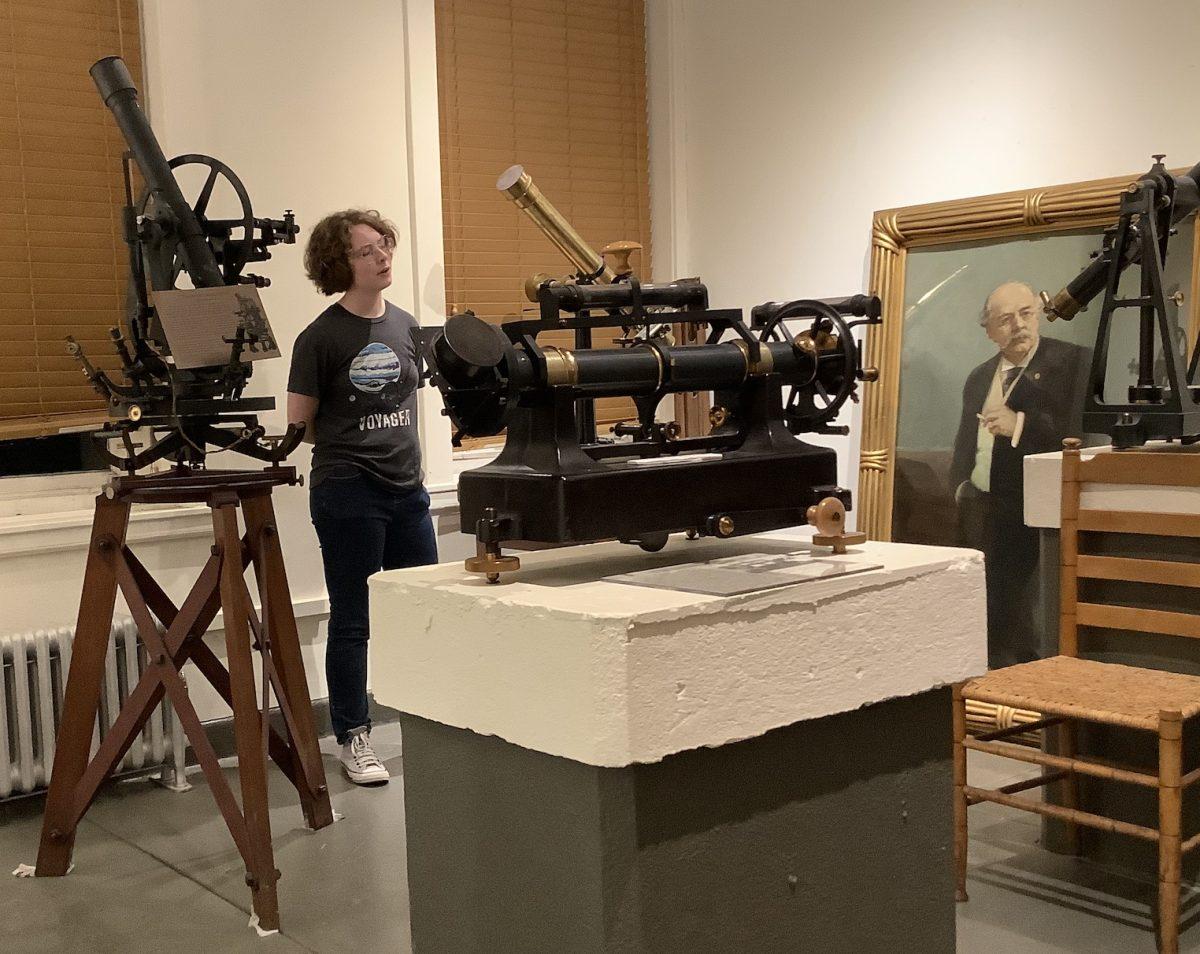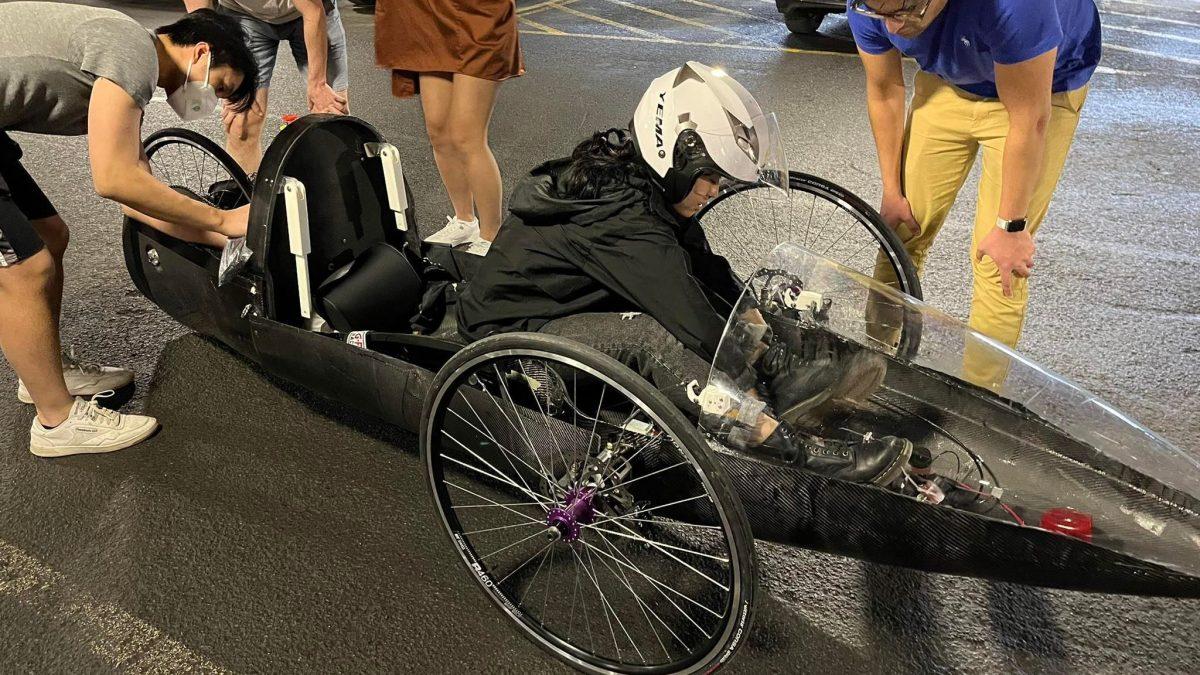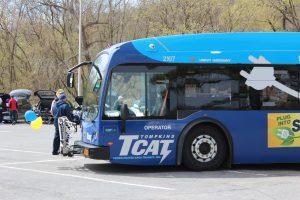
With their environmental benefits and increased gas prices, electric cars are getting more and more popular.
Newer companies like Tesla and legacy automobile companies are growing the availability of electric vehicles and making charging more accessible. While not yet the dominant force in car buying, Americans are really looking at the potential of electric vehicles. Cars.com, a website that compiles car listings online, reported that EV searches are up by 173% over the month of March, likely due to heightened gas prices, the company speculated.
Mike Kaufman, internet sales manager at Maguire dealerships in Ithaca, says that in the last two years the number of people seeking electric and hybrid vehicles has jumped dramatically.
“I mean, if you rewind time, gas was, you know, like $2.50 per gallon maybe a year or two ago, and now we’re pushing that $5 mark,” Kaufman said. “So when that happens, naturally, people do gravitate to hybrids and pure electric vehicles.”
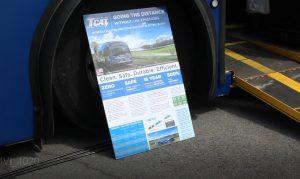
This boost is more than just a reaction to the heightened gas prices though – across New York State, EV and plug-in Hybrid registration has exploded, with over 39,000 new registrations last year alone, up from about 20,000 in 2020. In Tompkins County though, only about 1,300 are registered and on the road – and local groups like the Tompkins Cornell Cooperative Extension look to change that.
Their “Electric Vehicles for Earth Day” event gathered many people at Cass Park on the Saturday following Earth Day to view and speak to the owners of over a dozen different EV and plug in hybrid vehicles on display with additional showcases by TCAT, Ithaca Carshare, Bikeshare Tompkins, and more with an emphasis on affordability.
“It’s a really beautiful event because we’ve got people showing up who are owners who will speak from the heart about what it’s been like to own an electric vehicle and then also people who are just curious people who want to see how fast they can accelerate,” said Holly Payne, environment educator for the Cooperative Extension.
Payne organized the event and has worked with her organization in researching and leading education initiatives about electric vehicles like the Earth Day event.
“We’re at a really important moment in history, where people have a choice about whether they’re going to step into the new technology if they can afford it, or whether they’re going to continue burning fossil fuels, which harms the global climate,” said Payne. “So there’s a huge push to try to get people into electric vehicles.”
Barry Adams, a retired professor of English at Cornell is a proud owner of a 2019 Chevrolet Volt. His car was one of those on display at the Cass Park event, where he answered questions about his experience with it. He had previously driven Subaru cars, but wanted to switch for the sake of the environmental impact and says he really enjoys this new car. However, with the new type of engine comes different worries.
“The main concern is partly psychological: range anxiety,” said Adams, who travels between Brooktondale and Ithaca. “I’ve never had [running out of charge] happen to me, but that’s because I go short distances as a rule”.
He and others who point to this worry say that to alleviate this, being able to see more fast public charging stations outside of peoples’ homes established throughout the country would really make a difference.
“Whether it’ll happen in one or two generations. I don’t know, it takes time. But I think that will produce a kind of psychological adjustment to the range anxiety which is a real thing, even though it’s mental, is real.“
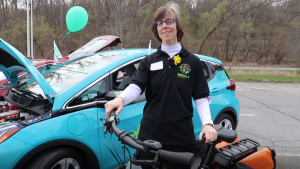
Another challenge is making sure electric vehicles are accessible to people of low to middle income. There’s a perception of electric cars, especially in brands like Tesla, that they can be unaffordable for a lot of people. A new Tesla Model 3 for example, marketed as the affordable car of the company’s lineup, goes for almost 47 thousand dollars. This isn’t the full picture, however, with many of the featured cars at the event being more affordable models by traditional automakers. Many new electric car models have an MSRP in the $20,000-$40,000 range. thousands of dollars range.
New York State offers a “Drive Clean” rebate of up to $2,000 for new purchases of electric cars in addition to federal tax credits for a switch, meaning that there’s a lot of encouragement not just from people like Holly Payne, but also the government to get more people over to EVs.
“The question is, well, can you afford it,” Payne said, continuing to highlight accessibility issues. “We’re looking very hard at ownership leasing, we’re looking at secondhand electric vehicles, we know the price will come down, because so many more models are going out right now and they will soon be secondhand models.”
Payne also argued for the maintenance cost benefits of Electric Cars and the fueling cost benefits of EVs when compared to traditional internal combustion engine vehicles.
“Once you own an electric vehicle, on average, this is actually on average before the price of gas spiked, you will be saving 60% on fueling,” Payne explained. “And you’ll be saving 50% in maintenance. So that’s the point at which you say wow, you know, not only will we not be burning fossil fuels, which harms the climate and the globe itself, but we will also be saving money. The tipping point is really whether you can afford that car.”
But Payne and others say it’s not just upgrading personal vehicles that will reduce emissions, it’s also about improving the infrastructure so personal vehicles don’t have to be used as much as they are altogether. That’s why Ithaca Carshare, Bike Walk Tompkins, an initiative pushing for bike-sharing’s return under a public-owned umbrella, and TCAT were present there.
Laura Lewis, Acting Mayor of the City of Ithaca and chair of the TCAT Board of Directors was at the event discussing the new buses and how they fit into other initiatives happening in the area.
“I think it has real benefits as we all increasingly talk about for very good reason, as we all talk about the Green New Deal, emissions wanting to cut down on emissions from vehicles, as well as cutting down on emissions from buildings, and that’s where we talk about the electrification of buildings. So there’s a lot going on all at once, which is very exciting.”
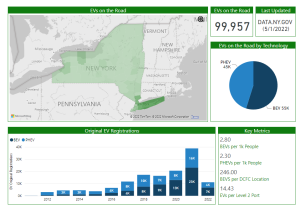
Seven of TCAT’s buses are electric, with more on the way, and the organization has a goal to make its entire fleet battery electric by 2035 as resources become available through grants and other funds. Lewis says that she sees electric vehicles’ promotion in public and personal transit as a significant part of the green new deal initiatives.
“As we talk about not just TCAT but as we talk about electric vehicles as a whole, there is a real need for additional electric vehicle charging stations throughout the city,” said Lewis. “We are also concerned with any development going forward in the city, we want to make sure that we’re including electric vehicle chargers in future development.”
Overall, the event served to give people a close up look at what a future car of theirs might be, and how decisions of what you drive and how often you drive can come into play as people locally and all over try to lessen their environmental impact.
“I think one of the most important things is to come and pop the hood, sit in the seats, ask questions to electric vehicle owners, look underneath it and understand,” Payne said.




